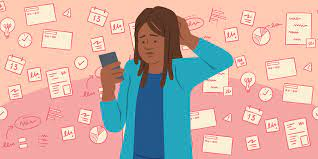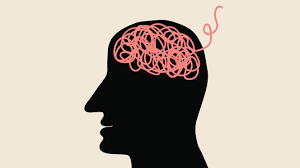ADHD has been clinically observed since 1798, there are people diagnosed with ADHD over 70 years old today, so it is not a current "screen generation" disorder. The problem is a physical structural problem in the development of the brain and not abstract, in the matter of not knowing how to deal with frustrations and adopting distraction as a "defense"... Does anyone really think that a person with ADD chooses to be distracted, to have difficulties in school, social and in the relationship, not being able to regulate the focus, even in the moments when the person wants the most and end up suffering because of it? Someone with this type of disorder not only learns to deal with frustrations (by dealing with a lot of them in various areas of life), but learns better than some who don't have ADHD to deal with it.
Just because the author of attention deficit disorder (misnamed) said the disorder was something he sort of discovered doesn't mean the condition has ceased to exist. ADHD is a quantitative issue. The main problems are: distraction, low emotional regulation and impulsivity. To explain these three, a dynamic integration of various parts of the brain is required, making everything very complicated to study. Even though ADHD is the most well-known disorder in psychiatry, there is still no explanation or cure for the disorder. There are so-called remissive cases in ADHD, where the person in adulthood loses part of the symptoms, but there is no exact reason why certain people continue with the disorder or not.
Within the academy, whether in private or public education, or sometimes even through the irresponsible 'sealing' of the most conservative, there is a lot of dualism between biological and psychological and a repulsion to the first by poorly informed psychology students, mainly due to the influence of some teachers and materials. Of course we should be critical of everything, the pharmaceutical industry and how teaching is presented and so on. but ignoring the biological issue is a big mistake, as was depression and other conditions more accepted now.

The arguments of some ''professionals'', whether coaches (many with crp) or other types, are a disservice primarily by a) Generating the impression that ADHD is a disorder invented to sell psychostimulants, and treatment with psychostimulants improves and the life of those who have this disorder, making them able to finally achieve goals in life. It is also possible to treat the disorder without the use of medication (each case is different), but with quality psychotherapy (it would be good to use both if possible); b) Assign a fallacious cause to the current generation "screen generation" as the possible problem. Since previous generations reported the same suffering with the disorder, in addition to being a disorder that can be hereditary (genetic), in this case not having much to do with the environment in which the person was exposed; and c) Blaming the person with the disorder for "preventing" (as if that were possible or controllable) the stimulus from reaching the brain and instead of dealing with it, he is "escape" from the situation.
In addition, certain ''therapies'', such as those that repeat cliché terms such as ''limiting beliefs'' and lists of goals, such as THE SOLUTION for the person with such disorder, making them believe that they will be ''cured. '' after she reconnects with her "me" again... This is no different from cancer cure religious quackery or "soul surgery" in mystical temples that are usually on a very strange corner downtown (almost most of the time these "surgeries" kill people).
Anyone who is diagnosed with ADHD in adulthood and currently takes medication feels how these medications would have helped positively in school life during childhood and adolescence, marked by many frustrations related mainly to school performance. There is a whole context of "what is behind each disease", but there are really scientific studies proving a differentiation of the brain of people with and without ADHD.
As much as one has the privilege of having psychiatric consultations and paying for medication (and nowadays it is more accessible) those who choose to abstain and raise flags against medication have the privilege of time and luck; time for alternative ''therapies'', time for so many lotus pose meditations, time to abstain, and perform your "personal discovery" (often the famous ''good vibes'') and fulfill an endless list of required goals by the coaches (many of them with register). But unfortunately a lot of people don't have that time, they have to work hard, support the family or in more complicated personal cases, they need to become financially independent from some toxic ''family'' as soon as possible, study (or have to become addicted to examinations of state enterprises as the rule has been for more than a decade) and the process of ''inner discovery'' ends up being sidelined.
Medicines like Concerta is not a methamphetamine, the principle is literally the same as Ritalin, which is Methylphenidate, the only difference is that the dose is higher, but the capsule has a slow release technology, according to which methylphenidate has minimal levels of addiction (if consumed in the right way and by those who really have ADHD). The medication that has a similar formulation is Venvanse, but it is formulated with L-lysine precisely to reduce this addictive aspect and a competent doctor should know this. ADHD is a chronic physiological condition, that is, there is no cure, because it is not properly a disease. Imagine a doctor who tells a type 2 diabetic patient (which is how ADHD is a hormonal condition, but a disease, in a very reducible comparison) that he will no longer be able to prescribe a certain medication since the patient can reverse diabetes by changing lifestyle, exercising and diet? Can medication 'weaning' occur? Yes, but it cannot be done in any way, just because you feel "cured" or because you have fulfilled and tripled all the coach's goals.
Beware of these types of "experts" who claim that the area itself is the solution to all their problems and who unfortunately are making a lot of money from it. Don't consider everything these people say just because he's an "authority" on the subject or in the therapeutic place, or he's a professor at USP (state university in Brazil), YALE (private university of the Yve league in the USA), or whatever. ... Question these types of people and research the contrary argument, to see if the other magical argument really holds up. If you suspect that you have the disorder, seek an appointment with a neurologist or psychiatrist to confirm or not the diagnosis, preferably a specialist who is not arrogant and does not sell solutions for everything. Taking medication does not mean that you will be dependent on it, much less your whole life and that one day you will not be able to give up the medication when things are more settled, balanced and you have found a greater reach over the difficulties of ADHD.

The ideal would be to unite these two worlds, the world of medication and the world of psychotherapies. Within psychology and psychoanalysis we should not blame people who seek the most effective method in the short term at the beginning of treatment, even as a matter of emergency, even more so because we must be understanding and empathetic with the social and personal issues involved. Not everything is solved with lists of goals and "individual effort" without brakes. Time is money, and we must respect the decisions of others until they have conditions, whether psychological or financial, to achieve this much desired ''self-knowledge''.






